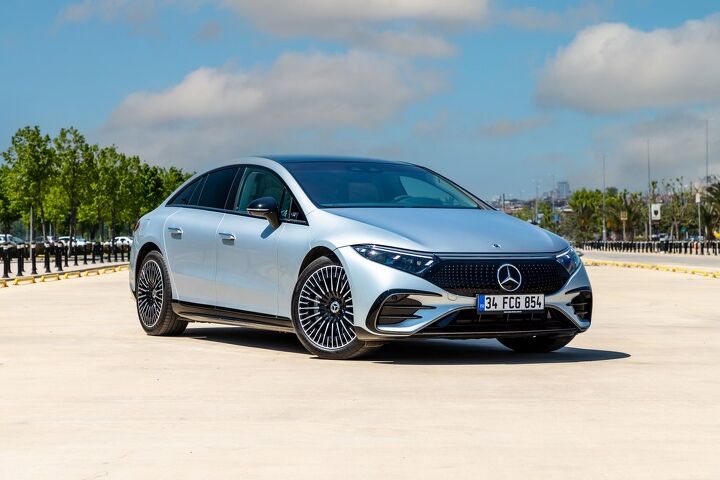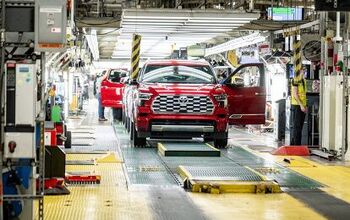Mercedes Debuts Acceleration Subscriptions for EQE, EQS

Mercedes-Benz has announced the Performance Acceleration On-Demand over-the-air update (OTA) for the all-electric EQS and EQE. While the update has the potential to boost output by as much as 80 horsepower on the EQS 450 4Matic, we doubt people will be singing its praises because the update is actually an upgrade that you'll have to purchase.
The Acceleration On-Demand “update” charges customers to add 60 horsepower to the EQE 350 4Matic and 80 hp to the EQS 450 4Matic — yielding some enviable changes in performance.
Mercedes claimed buying into the option reduces the EQE 350 sedan's launch from zero to 60 mph from 6.0 seconds to just 5.1 seconds. Meanwhile, the EQS 450 4MATIC sedan drops from 5.3 to 4.5 seconds, while the EQS 450 4MATIC SUV can shave off roughly a second to reach 0-60 mph in 4.9 seconds.
But it’s not free. On EQE 350 models, the upgrade costs $60 per month, $600 per year, or $1,950 for the vehicle's lifetime. By contrast, the beefier EQS 450 upgrade is $90 per month, $900 per year, or $2,950 for the vehicle's lifetime.
We suppose that’s not an unreasonable price for the kind of power you’ll be getting if you actually had to wrench on the thing. However, nothing has been done to the vehicles other than the manufacturer remotely tweaking the code to unlock something that was presumably already available. It’s also worth noting that the EQS starts above $100,000.
News broke that this scheme would be forthcoming in the latter half of 2022 (though we didn’t know all the details) and Mercedes has been experimenting with subscription models for quite some time. But it’s not something that’s limited to one manufacturer. We’re seeing numerous car companies trying to control who has access to customer data by snubbing services like Apple CarPlay and leveraging vehicular connectivity to obfuscate the very concept of private ownership.
Your author has been moaning about this kind of stuff for years. Despite occasional assertions from the peanut gallery that this was tinfoil-hat nonsense, the writing has been on the wall for ages. Entertainment companies have been trying to move away from physical media for years in an effort to con you into paying for it repeatedly via subscription models. But the assumed profitability of endlessly charging customers for items has caught on and now everyone is dabbling with the concept of products-as-a-service (PaaS).
If you’re unfamiliar with the premise, it basically focuses on the financial outcomes of the way something can be “sold” instead of the product itself. It usually manifests when businesses attempt to tack subscription services onto a physical product or totally re-imagine how goods are owned — with the end result always leaving control in the hands of the manufacturer. The whole thing is heavily reliant on the connectivity and the internet of things (smart devices) to function and likewise doubles as a way for companies to harvest customer data — which can be sold off as an additional revenue stream or utilized to improve services.
The automotive sector, which now seems to fancy itself an extension of the tech industry, also began pivoting in this direction when CEOs started harping on electrification and the alleged importance of “connected mobility.” The industry has been going ape shit ever since, often to the chagrin of customers.
If you’re someone interested in ensuring the proliferation of the above concepts, the Acceleration Increase On-Demand is available through the Mercedes me connect app. The store currently offers a handful of upgraded features that leverage hardware the car is already equipped with and is supposed to get much bigger in the months ahead.
[Image: emirhankaramuk/Shutterstock]
Become a TTAC insider. Get the latest news, features, TTAC takes, and everything else that gets to the truth about cars first by subscribing to our newsletter.

A staunch consumer advocate tracking industry trends and regulation. Before joining TTAC, Matt spent a decade working for marketing and research firms based in NYC. Clients included several of the world’s largest automakers, global tire brands, and aftermarket part suppliers. Dissatisfied with the corporate world and resentful of having to wear suits everyday, he pivoted to writing about cars. Since then, that man has become an ardent supporter of the right-to-repair movement, been interviewed on the auto industry by national radio broadcasts, driven more rental cars than anyone ever should, participated in amateur rallying events, and received the requisite minimum training as sanctioned by the SCCA. Handy with a wrench, Matt grew up surrounded by Detroit auto workers and managed to get a pizza delivery job before he was legally eligible. He later found himself driving box trucks through Manhattan, guaranteeing future sympathy for actual truckers. He continues to conduct research pertaining to the automotive sector as an independent contractor and has since moved back to his native Michigan, closer to where the cars are born. A contrarian, Matt claims to prefer understeer — stating that front and all-wheel drive vehicles cater best to his driving style.
More by Matt Posky
Latest Car Reviews
Read moreLatest Product Reviews
Read moreRecent Comments
- Lichtronamo Watch as the non-us based automakers shift more production to Mexico in the future.
- 28-Cars-Later " Electrek recently dug around in Tesla’s online parts catalog and found that the windshield costs a whopping $1,900 to replace.To be fair, that’s around what a Mercedes S-Class or Rivian windshield costs, but the Tesla’s glass is unique because of its shape. It’s also worth noting that most insurance plans have glass replacement options that can make the repair a low- or zero-cost issue. "Now I understand why my insurance is so high despite no claims for years and about 7,500 annual miles between three cars.
- AMcA My theory is that that when the Big 3 gave away the store to the UAW in the last contract, there was a side deal in which the UAW promised to go after the non-organized transplant plants. Even the UAW understands that if the wage differential gets too high it's gonna kill the golden goose.
- MKizzy Why else does range matter? Because in the EV advocate's dream scenario of a post-ICE future, the average multi-car household will find itself with more EVs in their garages and driveways than places to plug them in or the capacity to charge then all at once without significant electrical upgrades. Unless each vehicle has enough range to allow for multiple days without plugging in, fighting over charging access in multi-EV households will be right up there with finances for causes of domestic strife.
- 28-Cars-Later WSJ blurb in Think or Swim:Workers at Volkswagen's Tennessee factory voted to join the United Auto Workers, marking a historic win for the 89- year-old union that is seeking to expand where it has struggled before, with foreign-owned factories in the South.The vote is a breakthrough for the UAW, whose membership has shrunk by about three-quarters since the 1970s, to less than 400,000 workers last year.UAW leaders have hitched their growth ambitions to organizing nonunion auto factories, many of which are in southern states where the Detroit-based labor group has failed several times and antiunion sentiment abounds."People are ready for change," said Kelcey Smith, 48, who has worked in the VW plant's paint shop for about a year, after leaving his job at an Amazon.com warehouse in town. "We look forward to making history and bringing change throughout the entire South." ...Start the clock on a Chattanooga shutdown.


































Comments
Join the conversation
Holy crap that's friggin terrible
It's like... If I buy a product,.I better be able to use it 100%
Time to jailbreak and remove microchips then
That's a hard no from me, Chief.